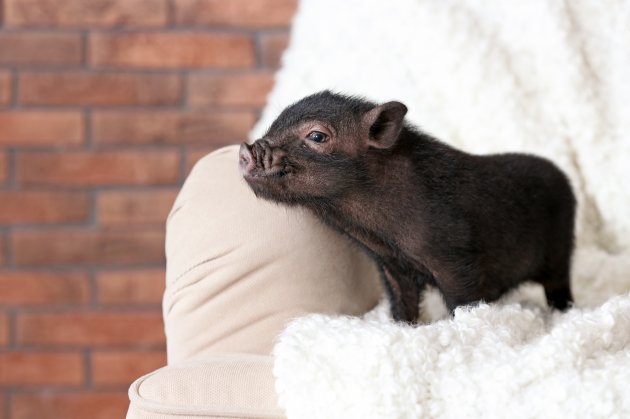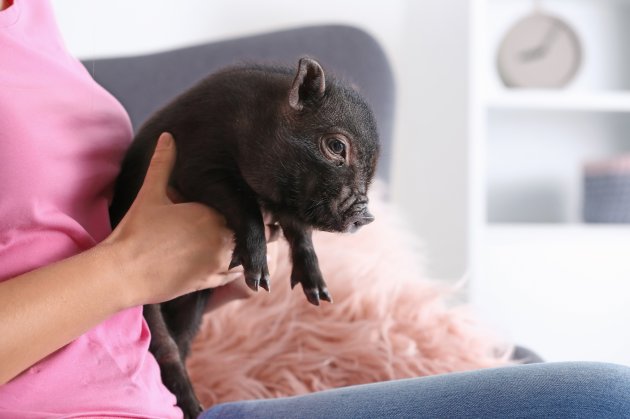Teacup pigs, widely known by names like 'Miniature pig', 'Micro pig', and 'Dwarf pig' have procured their names from their size. Dozens of Vietnamese potbellied pigs were imported to American zoos in 1986, which gave a newness to these pigs. The arrival of these pigs did not go unnoticed by the breeders.
To be a successful caretaker, you need to have a clear understanding of everything about any pet you are thinking to adopt, be it a lizard or a pig. Hence, if there is a thought wandering in your mind to adopt a ‘Teacup pig’ as a pet, going through the below pros and cons of the animal will help you make a final call.

Teacup Pig Pros
Lifespan
They are believed to have a long life. The longevity of potbellied pigs is anywhere between 12 to 20 years. The average life span estimated will purely be based on the parenting and exceptional care in areas of nutrition, habitat and cleanliness approach taken by the owner. Unfortunately, many of these cute animals don’t make it past five when they stay with breeders because the breeders don’t provide with them an appropriate diet as they want to slam the word 'Teacup' on these poor creatures.
Intelligence
Mini pigs are supremely intelligent and possess a very sharp memory. Adding them to the family is exactly the same as adding a child of 3 to 4 years, since both possess the same intellect. They can be trained to use a litter box and provide entertainment by performing various tricks.
Behaviour
They are really very friendly and enjoy human fellowship. They are emotional, social, playful, protecting and at the same time very sensitive and cuddly. When there are two or more Teacup pigs, they bond really well and show a lot of empathy towards each other.
Together, they love to sleep in piles, relax in the sun and cool off in the mud. However, a pig and a dog cannot be kept at the same place as this might take your peace away. Dogs are a large predator species, whereas pigs are prey species, which may lead to unwanted persecution of your pet pig. Grown-up pigs will also show hostility towards the dog when the matter is about food. However, Teacup pigs have a very peaceful relation with cats.
Physical appearance
They possess a variety of uncommon features namely small perked black ears, a short to medium wrinkled snout, pronounced potbelly, chubby figure, large jowls in proportion to the head, short legs and neck and a tiny tail with plentiful hair at the end. They have fine hairs which do not shed. They are mostly black in colour with occasional white on the snout, head, feet and tail. They are also found in grey or completely white colour.
Weight
A Teacup pig weighs somewhere between 50 pounds to 100 pounds when they are newborn or have not matured. Unfortunately, the misleading information regarding their weight and size have dissatisfied owners with their pet pigs. At around 3 to 6 years, miniature pigs are fully grown and weigh up to 250 pounds. If several Teacup pigs owners’ experiences are to be believed, when these pigs mature completely, the weight shoots up to as much as around 700 pounds for female pigs and 1,000 pounds for male pigs. A Teacup pig will remain the size of a teacup hardly for a few months.
Body odour
They are clean and have no foul smell, unlike few other animals. They like a tidy space to sleep in. However, due care must be taken by the owner to maintain cleanliness which includes daily shower, trimming of husks and tusks, cleaning up its waste and keeping its place spick and span.

Teacup Pig Cons
'Teacup' is a myth
Words like Micro, Mini, and Dwarf are misleading and are just elusive labels which actually don't exist. Almost all Teacup pigs sold are either newly born or extremely young and are yet to reach full size and weight or at worst, malnourished so they remain little and can be publicized as 'Teacup'. Be aware, whatever you adopt, it will never fit inside a teacup after some time.
Municipality law for your area
Before adopting Teacup pigs, you have to check with the municipality whether your locality allow pigs as a pet because according to norms and beliefs of some municipalities, these are farm animals and therefore cannot be kept as a pet.
Bath
They can be made to bathe with mild human products like baby shampoos but to make them bathe will certainly test your patience because all pigs don’t love to bathe. If they really don’t want to have one, they might show you their worst side by getting loud, poop in the tub or jump to escape the shower.
Health issues
Teacup pigs need excessive care when it comes to their health. They are prone to diseases like obesity, respiratory and nasal infections, motion sickness, constipation, urinary tract issues and skin problems like sunburn, dry, itchy skin and melanoma. Any of these health issues might occur at any point which needs to be addressed quickly by a vet. Hence, the owner should very actively and carefully monitor the pet.
Vet
A Teacup pig might live up to 20 years. During this period, you would definitely need to plan vet visits. They also require vaccinations like humans and are susceptible to illness like flu and other health issues mentioned above. So, to be on the safer side, just check out the nearby veterinary homes for pigs as all veterinary hospitals don't treat pigs.
Temperature adaptability
The normal body temperature of a pig ranges from 101.6 to 104-degrees F. For most parts, pigs handle cold better than heat. In hot weather, they do not sweat but they pant. During the hot climate, maintain a well-ventilated area for them and provide lots of fresh clean water whereas, during cold climate, proper heating and ventilation should be in place for them.
Diet needs
They need a balance of Vitamins, Minerals, Proteins, Fibre and Carbohydrates. They need a healthy diet filled with complete nutrition. Being omnivores, they are likely to eat almost everything that comes their way, but that does not mean they should. Their diet should primarily consist of grains and leafy vegetables, potatoes, grass, fruits and up to 12% protein. They need to have a huge amount of water daily at regular intervals. However, finding pig feed in a local store is very challenging. Teacup pigs are farm animals, so the farmers import pig feed in bulk directly from manufacturing companies. Hence, the owners might face some issues to get the pig's feed.
Having meal
Teacup pigs being greatly prompted by food can be troublesome at times as they can easily learn to get into cabinets, trash cans or the refrigerator. When it comes to having a meal, they are really messy at times. They are infamous for getting their meal everywhere and tipping their water bowls. They are also aggressive and need to be trained.
Housing
Teacup pigs need to root around, explore and manipulate things meant for them. If they don’t find an atmosphere meant for them, they are experts on creating one for themselves, often by rooting through cupboards, tearing apart couches and knocking over tables. The owner needs to provide them with an outdoor area with shelter and wallow to carry out their activities.
Maintenance
Sadly, their maintenance cost is not as small as their name. Adopting them would cost somewhere between $750 to $3,500. Other costs adding to the summary might include Licensing, Veterinary bills (Vaccinations, Parasite Treatments, Check-ups and treatment of injury and illness, Tusks/Hoof trims), Food Costs, Housing – Fencing - Bedding, Cost of care while you are away on vacation and lastly the cost of your valuables destroyed by your pet pig.
This ends up our summary of pros and cons. We hope that the above points give you clarity about the Teacup pigs and help to decide whether you are ready to be a Teacup pig owner.
Sources and further readings:
- peta.org, Why You Should Think Twice Before Adding a ‘Teacup’ Pig to Your Family
- BC SPCA,12 Things to know before adopting a mini pig
- BestFriends.org,Teacup Pig Facts